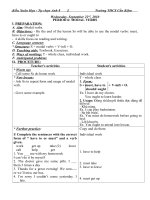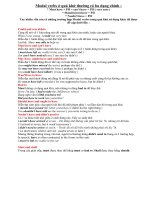modal verbs
Bạn đang xem bản rút gọn của tài liệu. Xem và tải ngay bản đầy đủ của tài liệu tại đây (105.27 KB, 4 trang )
<span class='text_page_counter'>(1)</span>Modal Verbs.
<span class='text_page_counter'>(2)</span> Ability could (ability in the past). " Could " is more usual than " was able to " ; it is used in statements for repeated actions. However, with the verbs see, hear, smell, understand etc, we normally use " could " for single actions. E.g. She could /was able to play the violin when she was six. (repeated action) I could smell something burning. (single action) was able to (=managed to-ability in the past) is used for either repeated or single actions. E.g. I was able to go on a trip round the city last week.(single action) could/was able to can both be used in negations and questions for either repeated or single actions. E.g. She couldn't/wasn't able to pass her driving test. ( single action) Were you able to/Could you get to work yesterday? (single action). managed to suggests the ability to do something difficult or which requires considerable effort. E.g. The fire spread through the building very quickly, but fortunately everybody managed to escape. Compare: Mike was an excellent tennis player when he was younger. He could beat anybody. (= he had the general ability to beat anybody) but Mike and Pete played tennis yesterday. Pete played very well, but Mike managed to beat him. (= he managed to beat him in this particular game).
<span class='text_page_counter'>(3)</span> Possibility may/might/could + perfect infinitive ( perhaps something happened in the past) E.g. She looks miserable. She may/might/could have lost her job. ( perhaps she has lost her job) Advice (saying what the best thing to do is) should/ought to + present infinitive (it is the best thing to do; I advise you to) *(ought to is sometimes used for advice based on laws, rules or generally accepted ideas) E.g. You should stop smoking. ( general advice; I advise you) You ought to treat animals kindly. ( Most people believe this.) had better ( it's a good idea-advice for a specific situation) E.g. You'd better call your parents or they'll worry. ( it's a good idea; specific situation) Obligation must/have to (it's necessary, I'm obliged to) Must is used only in the present and future when the speaker decides. E.g. I must lose some weight. (I say so.) Have to is used when the necessity comes from outside the speaker or when others decide for him. E.g. I have to lose some weight. ( The doctor says so; the doctor decides for me.) Ought to (duty; it's the right thing to do but people don't always do it.) E.g. We ought to respect the environment..
<span class='text_page_counter'>(4)</span> Exercises Answer keys. .Q.1. Compare the following sentences. Mike was an excellent tennis player when he was younger. .1 .Q.1. Compare the following sentences .He could beat anybody _______________________________________________________________ Mike was an excellent tennis player when he was younger. .1 ___________________________________________________________ .He could beat anybody Mike and Pete played tennis yesterday. Pete played very .2 He had the general ability to beat anybody. .well, but Mike managed to beat him _______________________________________________________________ Mike and Pete played tennis yesterday. Pete played very .2 ___________________________________________________________ .well, but Mike managed to beat him He managed to beat him in this particular game. Q.2. Give advice for these situations.. 1. Kate is starving. Q.2. Give advice for these situations. _________________________________________________________ 2. a lot of work to do. 1. I've Kategot is starving. _________________________________________________________ She'd better eat something! 3. need myto English. 2. II've gottoa improve lot of work do. _________________________________________________________ You ought to start doing it now. 4. late for work. 3. George I need toisimprove my English. _________________________________________________________ You should read English stories and novels. 5. isn't feeling 4. Mary George is late for well. work. _________________________________________________________ He'd better go now. The bus leaves in five minutes. 5. Mary isn't feeling well. She should see a doctor..
<span class='text_page_counter'>(5)</span>









